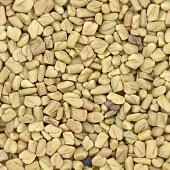Fenugreek - Natural Health Product
Non-traditional solutions to help boost your health and wellness.
Fenugreek
General Information
The use of fenugreek has been recorded as far back as ancient Egyptian times.
Common Name(s)
Scientific Name(s)

How is this product usually used?
Fenugreek seeds are dried and taken by mouth (orally) or applied to the skin (topically) as extracts, tinctures, decoctions, or infusions.
When taken orally, the recommended dosage is 2 g to 30 g per day. When used topically, the recommended dosage should be applied to the affected area as needed or added to a hot bath, being sure not to exceed more than 50 g of dried seed per day.
Your health care provider may have recommended using this product in other ways. Contact a health care provider if you have questions.
What is this product used for?
Traditionally, fenugreek is taken orally in herbal medicine to:
- stimulate appetite
- improve digestion
- relieve upset stomach
- relieve constipation
- eliminate excess mucus from the upper airways
- increase milk production
- maintain healthy blood sugar levels
- reduce cholesterol
Other uses of fenugreek include improving sexual arousal and drive, as well as reducing menstrual pain.
Fenugreek is applied to the skin to help treat skin wounds, burns, irritation, and inflammation.
Your health care provider may have recommended this product for other conditions. Contact a health care provider if you have questions.
What else should I be aware of?
Fenugreek may be effective for improving blood sugar control, reducing menstrual pain, improving sexual arousal and drive. There is limited evidence to support its other uses.
Side effects are mainly gastrointestinal and can include abdominal pain, bloating, gas, diarrhea, nausea, and upset stomach. It may also lower blood sugar levels.
Fenugreek may interact with the following:
- anticoagulants (e.g., apixaban, warfarin)
- antiplatelets (e.g., acetylsalicylic acid (ASA), clopidogrel)
- diabetes medications (e.g., metformin, sitagliptin)
- metoprolol
- theophylline
Pregnant women should use caution as this product has been used historically to induce labour. People with diabetes should ask their doctor before taking fenugreek due to the risk of low blood sugar episodes (hypoglycemia).
Do not take fenugreek if you are allergic to other Fabaceae plants, including soybeans, chickpeas, peanuts, green peas, and other legumes.
Stop taking fenugreek at least 2 weeks before surgery.
Before taking any new medications, including natural health products, speak to your physician, pharmacist, or other health care provider. Tell your health care provider about any natural health products you may be taking.
Source(s)
- Health Canada. Drugs & Health Products. Fenugreek – Trigonella Foenum-Graecum Oral Monograph. https://webprod.hc-sc.gc.ca/nhpid-bdipsn/atReq.do?atid=fenugreek.oral&lang=eng.
- Health Canada. Drugs & Health Products. Fenugreek – Trigonella Foenum-Graecum Topical Monograph. https://webprod.hc-sc.gc.ca/nhpid-bdipsn/atReq.do?atid=fenugreek.topical&lang=eng.
- Natural Medicines Comprehensive Database. Fenugreek.
All material copyright MediResource Inc. 1996 – 2020. Terms and conditions of use. The contents herein are for informational purposes only. Always seek the advice of your physician or other qualified health provider with any questions you may have regarding a medical condition.


